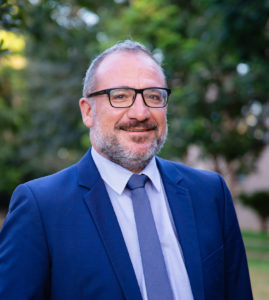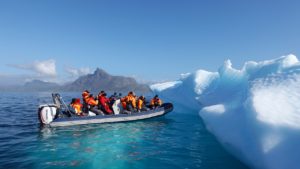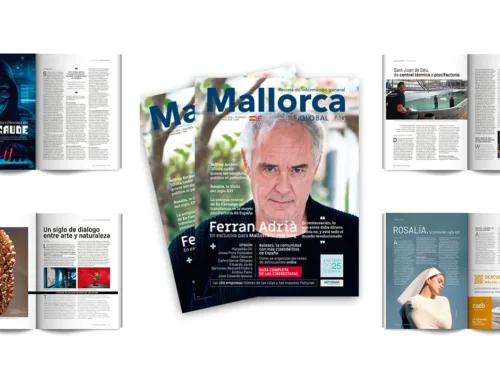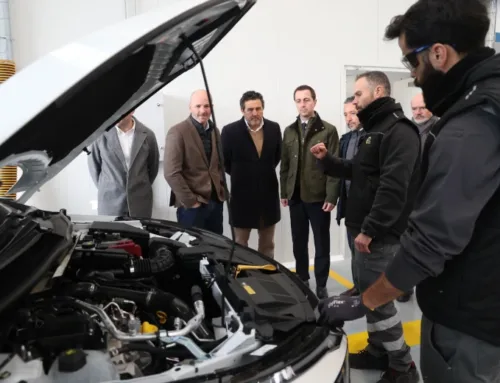The UN Environment Programme Director for Europe speaks exclusively to Mallorca Caprice about the effects of climate change.
Text: Raúl Beltrán. Palma.
– The data and forecasts on the deterioration of the environment are shocking. Are we on time?
– Our latest Emissions Gap Report reveals that we are currently headed towards a global temperature increase of 2.7°C this century compared to pre-industrial times, based on the emission-cutting pledges submitted to the UN. A temperature rise of 1.5°C, as committed to under the Paris Agreement, would still mean that sea levels rise 48cm, as the effects of climate change will continue to last for a few decades even after we have decarbonized. Meanwhile, a temperature increase of 3°C would mean that the Greenland ice sheet would collapse, and sea levels could go up by seven metres. A great deal is therefore at stake.
As things stand, governments still plan to produce more than double the amount of fossil fuels in 2030 than would be needed to get on track to limit the temperature rise to 1.5°C. So time really is running out to halt the climate emergency. While progress has been made at the COP26 climate talks in Glasgow, the commitments made by countries are not yet enough.
However, so much is still within our grasp. Renewables are now largely cheaper than fossil fuels, yet we continue to subsidise the latter. Ending our dependence on fossil fuels also means huge benefits for our health. We know what we need to do. Many champions, from countries to cities and individuals, are showing the way. And every tenth of a degree of global warming that we avoid makes a huge difference to people’s lives and our planet.

Bruno Pozzi. Photo: UN.
– You have assured that our current lifestyles are not sustainable. How should we change them?
– To know where we are going, we must first understand where we have been. So, take a look at your trash cans, observing what has been thrown out and reflect on your consumption habits. If your bin is full of plastic packaging, why not opt for more fresh food. If organic waste is piling up, maybe put more care into the amount you cook. Changing into a sustainable lifestyle does not mean we need to go out and buy new things. Rather, it is about being more aware of the consequences of our choices and can even save money.
Governments and organisations also play a crucial role in teaching people — particularly young generations, who make up a significant portion of our consumer society. The behaviours our kids pick up today will have a significant impact on their future spending patterns. Educational programs, policies, and parents’ examples can help set a “default” sustainable way our future generations act.
– Mallorca is an island in the Mediterranean and, precisely, it is said that this area will be one of the most affected by the effects of climate change. What are the specific threats to this area of Europe?
– The Mediterranean shows how climate change is a ‘now’ problem, rather than a future one. Land and sea temperatures there are already 1.5°C higher than during pre-industrial times. As the deep sea gets warmer, it gets more acidic, threatening fish and other biodiversity. Meanwhile, over the past twenty years or so, the Mediterranean’s mean sea level has already risen by six centimetres. Without climate action now, this will sadly continue to threaten communities by making flooding more likely, while also taking sand away from our much-treasured beaches. Pollution, land use change and invasive species also pose threats to the Sea. Meanwhile, on land, climate change means an increase in the frequency and severity of droughts, causing water scarcity.

This is why UNEP acts as the Secretariat for the Mediterranean Action Plan (MAP), set up some 46 years ago. The MAP brings the region’s countries together to share knowledge and commit to agreements on topics ranging from protected areas to cleaning up pollution. Leaders are also emerging from the Sea’s waters! For example, Lefteris Arapakis is a UNEP Young Champion of the Earth recognized for his work recovering huge quantities of plastic waste from the Sea, which is then upcycled. This is not only helping to clean the environment, but is also boosting fishers’ incomes.
Islands are among the parts of our world most threatened by climate change.
– Is insularity an advantage or rather the opposite to fight against climate change?
– Islands are among the parts of our world most threatened by climate change, as they are so sensitive to sea level rise and changes in temperature and rainfall, for example. Meanwhile, adaptation to climate change, such as the building of sea walls, can involve large costs that are more challenging to take on when a high proportion of land is at the seashore.
Yet, when it comes to fighting climate change, the big advantage is that islanders can benefit more directly or even own the green solutions close to home. A community-based approach can bring about enormous benefits for all of society. For example, there are islands in Europe moving to end their use of fossil fuels based on an initiative started by a small group of citizens. Other islands are aiming for zero waste or use wind power to produce more emission-free electricity than they can use.
– Citizens do not understand why solar energy is not promoted more. Do the sunny days that illuminate southern Europe should not trigger a strong commitment to this energy as an alternative to traditional ones?
– Absolutely! Make no mistake about it: solar power is on the rise, and it is the most popular form of renewable energy to have been installed over the past decade or so. The price of this technology keeps falling, unlike fossil fuel-based energy. Yet many sunny countries don’t take full advantage of their potential. It is not just about southern Europe. All countries can certainly do more to create the right conditions for investment in renewable energy – not least by ending fossil fuel subsidies. And we need to ensure that we can take up and integrate different sources of green power across the region to provide a stable green supply to our homes and businesses.
All countries can certainly do more to create the right conditions for investment in renewable energy.
– Mallorca will be a pioneer in the production of green hydrogen through the Power to Green project. How do you rate this initiative?
– Green hydrogen can have a valuable role in decarbonizing emission-intensive sectors, such as industry and transport. It is made by using renewable energy to split water into hydrogen and oxygen through a process known as electrolysis. If we are to achieve emission reduction targets, increasing the uptake of green hydrogen will be critical. This technology currently generally requires considerable investment and is complex on a technical level. So any project that manages to overcome these hurdles deserves to be lauded! Meanwhile, another very encouraging breakthrough occurred recently. A green hydrogen initiative has been named as one of the winners of the Earthshot prize, a major global award supporting solutions for our planet.
– What New Year’s resolutions should a person who really wants a less negative impact on the environment set himself / herself? What are those everyday gestures that could make a difference?
– There are so many things one can do, from saving energy, to walking or getting about by bike where possible, to reusing and recycling… Yet we don’t need to wait till the New Year to make positive changes in our lives. Step by step, change what you can. It’s about making better decisions for ourselves and the planet and being consistent. For practical tips, people can discover the UN’s Act Now campaign, or UNEP’s Anatomy of Action initiative. We can all make the positive changes a habit.
We don’t need to wait till the New Year to make positive changes in our lives.








Leave A Comment